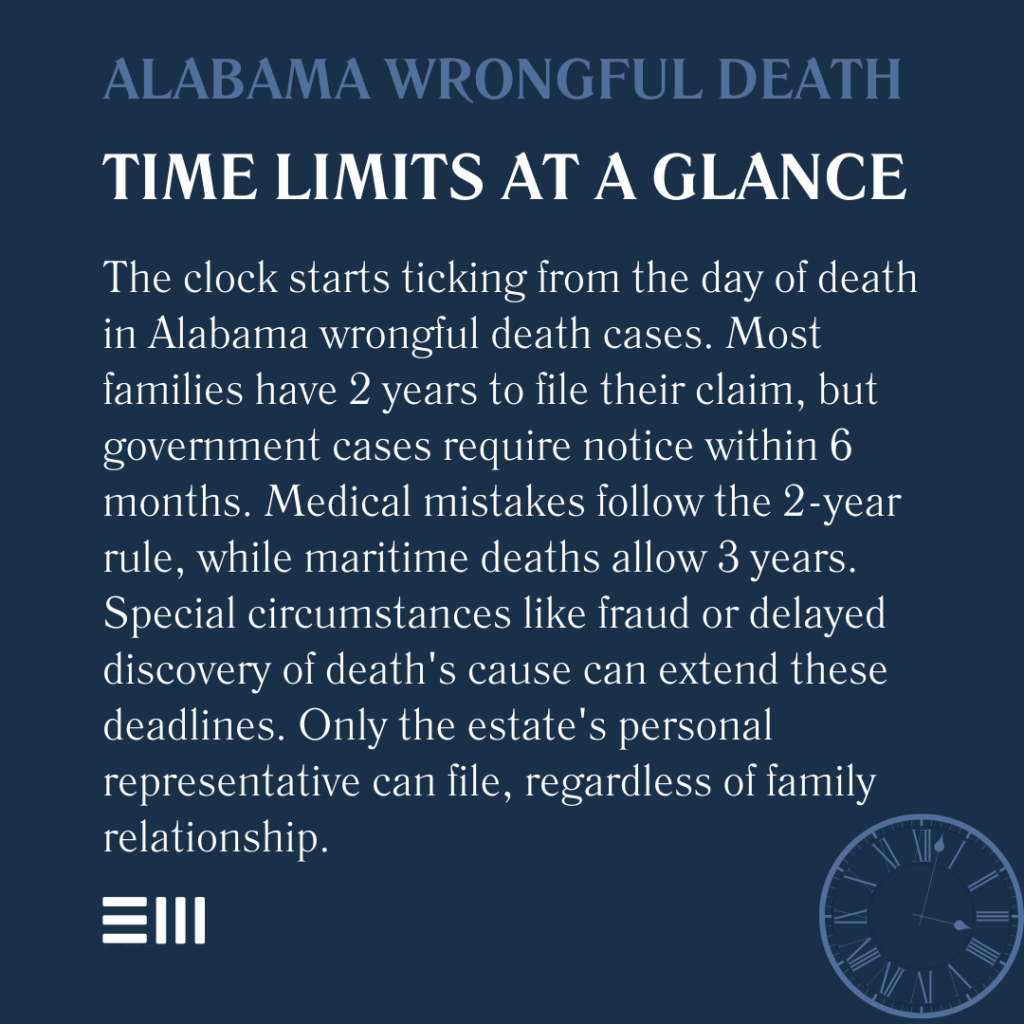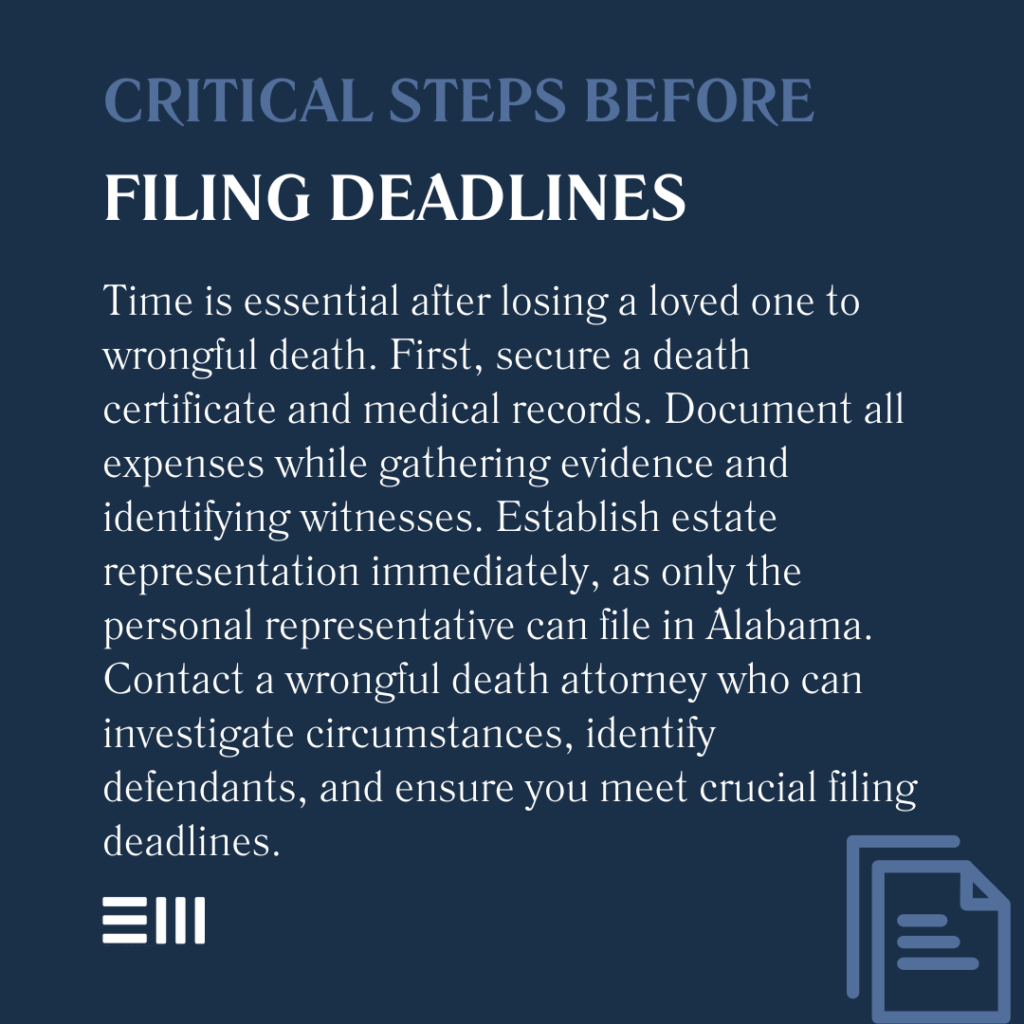
The knock at the door. The phone call in the middle of the night. These moments forever divide a family’s life into “before” and “after.”
When a loved one’s life is cut short due to someone else’s negligence, families often discover that grief is only the beginning of their journey.
While nothing can truly compensate for such a profound loss, Alabama law provides a pathway to justice—but this path has strict time limits.
Missing these deadlines can permanently close the door to holding responsible parties accountable.
What Are Wrongful Death Time Limits in Alabama?
In Alabama, the statute of limitations for filing a wrongful death lawsuit is typically two years from the date of death.
However, several factors can affect this timeline, potentially extending or shortening the period during which you can file. Let’s explore the key aspects of these time limits and how they might impact your case.
Standard Time Limits
Understanding the basic timeframes for wrongful death claims helps ensure you don’t miss critical deadlines that could affect your case.
- Two-year statute of limitations from date of death;
- Claims against government entities require notice within six months;
- Medical malpractice cases follow the same two-year rule; and
- Maritime wrongful death cases have a three-year limit.
These standard time limits serve as the foundation for most wrongful death cases in Alabama, though exceptions may apply based on specific circumstances.
Exceptions to Standard Time Limits
Various situations can alter the standard filing deadlines, making it essential to understand how these exceptions might apply to your case.
- Cases involving minors may have extended deadlines;
- Discovery rule applies when cause of death was not immediately apparent;
- Fraudulent concealment can toll the statute of limitations; and
- Criminal cases may affect civil case timelines.
Knowing these exceptions can help preserve your legal rights and ensure you have the opportunity to seek justice for your loved one.
Time Limit Variables That May Affect Your Case
Several circumstances can influence the time limits for filing your wrongful death claim. Being aware of these factors helps you make informed decisions about your case timing.
Factors That May Extend Time Limits
Understanding potential deadline extensions can help you plan your legal strategy more effectively.
- Delayed discovery of death’s cause;
- Defendant’s absence from the state;
- Mental incapacity of the personal representative;
- Ongoing criminal investigations; and
- Fraudulent concealment of facts.
These factors can provide additional time to file your claim, but it’s important to consult with legal counsel to confirm if they apply to your situation.
Factors That May Shorten Time Limits
Being aware of circumstances that could reduce your filing time is crucial for protecting your legal rights.
- Claims against municipalities;
- Federal government cases;
- Workers’ compensation death benefits;
- Insurance policy requirements; and
- Maritime law cases.
Understanding these time-limiting factors helps ensure you take appropriate action within the required timeframe.

Common Questions About Wrongful Death Time Limits in Alabama
Many families have questions about the timing of wrongful death claims.
Here are essential answers to help guide you through this complex process.
When Does the Time Limit Begin?
Understanding when the clock starts ticking is crucial for meeting filing deadlines.
- The statute of limitations typically starts running from the date of death;
- Some exceptions exist when the cause isn’t immediately apparent;
- The discovery rule may apply in certain circumstances; and
- Criminal investigations can affect the starting date.
These timing considerations play a vital role in determining when to file your claim.
How Can I Determine My Filing Deadline?
Several key factors influence your specific filing deadline.
- The circumstances of death;
- The type of defendant (individual, company, or government);
- Whether criminal charges are involved; and
- The discovery date of death’s cause.
Understanding these factors helps ensure you file within the appropriate timeframe.
What if I Miss the Filing Deadline?
The consequences of missing filing deadlines can be severe.
- Courts rarely make exceptions to statutes of limitations;
- Missing the deadline usually bars recovery;
- Limited exceptions exist for extraordinary circumstances; and
- Prompt action is essential.
Being aware of these consequences emphasizes the importance of timely action.
Can Time Limits Be Extended?
Certain circumstances may allow for deadline extensions.
- The defendant fraudulently concealed information;
- The cause of death was discovered later;
- Legal disability or incapacity exists; and
- The defendant left the state.
These potential extensions shouldn’t be relied upon without legal consultation.
Who Can File Within These Time Limits?
Alabama law has specific requirements about who can file wrongful death claims.
- Only the personal representative can file;
- Family relationship doesn’t guarantee filing rights;
- The estate must be properly established; and
- Court appointment may be necessary.
These filing requirements add another layer of complexity to timing considerations.
Carefully reviewing these questions and answers with a legal professional can help ensure you understand your rights and responsibilities in a wrongful death case.
Steps to Take Before Time Limits Expire
Taking prompt action helps preserve your legal rights and strengthens your case. Consider these essential steps before the filing deadline approaches.
Immediate Actions
The first steps you take after a wrongful death can significantly impact your case’s success.
- Contact an experienced wrongful death attorney;
- Gather relevant documentation and evidence;
- Obtain death certificate and medical records;
- Identify potential witnesses; and
- Document all related expenses.
Taking these initial steps promptly helps build a strong foundation for your case.
Legal Preparations
Proper legal groundwork is essential for meeting filing deadlines and building a compelling case.
- Establish estate representation;
- Investigate circumstances of death;
- Identify all potential defendants;
- Calculate potential damages; and
- Preserve evidence and testimony.
These preparations help ensure your case meets all legal requirements and deadlines.

Get Help With Your Wrongful Death Claim Today
Don’t let time slip away. Our experienced Alabama wrongful death attorneys understand the complexities of these cases and the importance of acting within legal time limits.
Contact us today for a free, confidential consultation to protect your family’s rights and secure the justice your loved one deserves.
Can't find what you're looking for? Search our site below.










